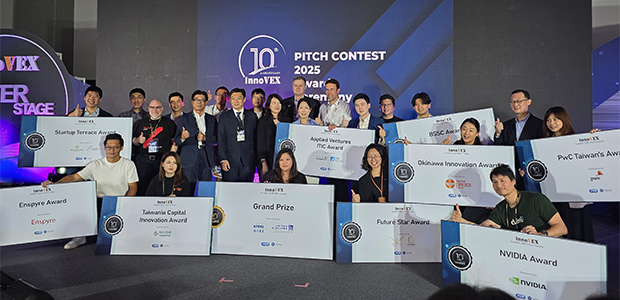
The winners of the InnoVEX Pitch Contest 2025
Attendees, judges, and startups all gathered together on the Thursday afternoon of InnoVEX 2025 to witness the annual InnoVEX Pitching Competition. Startups each had 10 minutes, split into a five minute presentation, and five minute Q&A from the judges.
This year's competition focused on seven pivotal sectors that are currently driving the industry: Artificial Intelligence (AI), Greentech, Healthcare & Biotech, Next-Generation Communication, Precision Manufacturing, Semiconductor Applications, and Smart Mobility. With a total prize fund of $140,000, the contest features the InnoVEX Grand Prize worth $30,000, alongside the Future Star Award, designed to highlight early-stage startups showing strong potential.
The judges of the competition were well-versed and experienced within the sector, and included:
• Gordon Harling, CMC Microsystems
• Wilson Khoo, co-pace, Continental AG
• Karen Yu, ITIC
• Ting-an Wan, National Development Fund
• Lamin Ben Hamdane, Infineon Technologies
The winners are...
With stiff competition this year, the judges had their work cut out for them, but after deliberation, finally decided on the winners.
Applied Ventures ITIC Award: NeuReality
NeuReality is an Israeli startup specialising in AI inference solutions for data centres. The startup’s flagship product, the NR1, is a NAPU-based system that integrates networking, virtualisation, and AI-specific processing into a single chip. This design aims to eliminate bottlenecks caused by general-purpose CPUs in AI inference pipelines.
BSSC Award: Accelerate Private Machine Intelligence Company
Accelerate Private Machine Intelligence Company (APMIC) was founded in 2017 in Taiwan, and specialises in enterprise-grade AI solutions, focusing on secure, on-premise deployments tailored to specific industry needs.
Enspyre Award: SOIC Marine Solutions
SOIC Marine Solutions is a Taiwanese maritime tech startup that was founded in 2023. The company focuses on developing AI-driven navigation systems that aim to enhance maritime safety and operational efficiency. Its flagship product, the AI Sailor, is an intelligent navigation system designed to assist vessels in real-time decision-making. The system integrates data from various onboard sensors, such as IP cameras, Automatic identification Systems, sonar depth measurements, and GPS.
NVIDIA Award: AeiROBOT and Deeli AI
AeiROBOT is a South Korean robotics startup that originated as a research-based spin-off from Hanyang University. It focuses on developing humanoid robots and interactive robotic content, aiming to create robots that seamlessly integrate into human environments. ALICE, its flagship humanoid robot, incorporates advanced features such as omnidirectional walking, enhanced vision recognition using deep learning models like YOLOv7, and improved localisation algorithms. These enhancements aim to optimise movement, improve predictability, and maintain balance and stability in dynamic environments.
Deeli AI is a Taiwanese and US-based startup that was founded in 2023. The company specialises in AI-driven technology intelligence platforms that are designed to streamline the discovery and evaluation of emerging technologies. Deel AI’s Immortal platform leverages AI to find and analyse vast amounts of data from sources such as academic papers, patents, grants, startup activities, and market trends. This enables organisations, including R&D departments, VC firms, and policymakers, to condense weeks of technology scouting and investment evaluation into minutes.
PwC Taiwan Award: EndoSemio
EndoSemio is a Taiwanese medical device startup founded in 2023. The startup specialises in developing single-use, miniaturised endoscopic imaging devices aimed at enhancing surgical safety, improving patient outcomes, and streamlining clinical workflows. It’s innovations focus on integrating high-definition CMOS imaging sensors with ultra-fine, biocompatible tubing, to enable the creation of compact, disposable endoscopes. These devices are designed to address specific clinical needs, particularly in scenarios where traditional reusable endoscopes may pose challenges due to size constraints or sterilisation requirements.
Okinawa Innovation Award: AeiRobot
AeiROBOT is focused on developing humanoid robots and interactive robotic content, aiming to create robots that seamlessly integrate into human environments. One of its biggest drivers is to rejuvenate the manufacturing industry, especially in South Korea, where 99% of its businesses are SMEs, and need better manufacturing capabilities.
TAIWANIA Capital Innovation Award: Jmem Technology
Jmem Technology is a Taiwanese semiconductor startup that specialises in hardware-based cybersecurity solutions that are designed to address the emerging security threats posed by quantum computing. The company focuses on integrating Post-Quantum Cryptography (PQC) and Physical Unclonable Function (PUF) technologies into chip-level security architectures.
Future Star Award: KopherBit
KopherBit is a Taiwanese startup that specialises in software and firmware development, with a focus on electric vehicles (EVs) and sustainable mobility. It aims to assist EV manufacturers in building software systems compliant with international automotive standards, particularly AUTOSAR (AUTomotive Open System ARchitecture).
Startup Terrace Award: Femtosense
Femtosense is a Silicon Valley-based semiconductor startup founded in 2018 by researchers from Stanford University's Brains in Silicon Lab. The company develops ultra-efficient, neuromorphic-inspired AI accelerators designed to enable real-time, on-device AI in consumer electronics, wearables, and other Edge devices.
Grand Prize: DeepRad.AI
DeepRad.AI is a Taiwanese medtech startup that focuses on integrating advanced AI with medical imaging to enhance early disease detection and preventive healthcare. Its first offering, DeepLung-CAC, is an AI-powered platform that enables simultaneous screening for pulmonary nodules, coronary artery calcification, and bone density risk using a single low-dose computed tomography scan. It incorporates the LungRads module, trained on over 6,000 CT cases, to detect and analyse lung nodules in under one minute, and aims to reduce interpretation time from the traditional 25–30 minutes to just five minutes.

